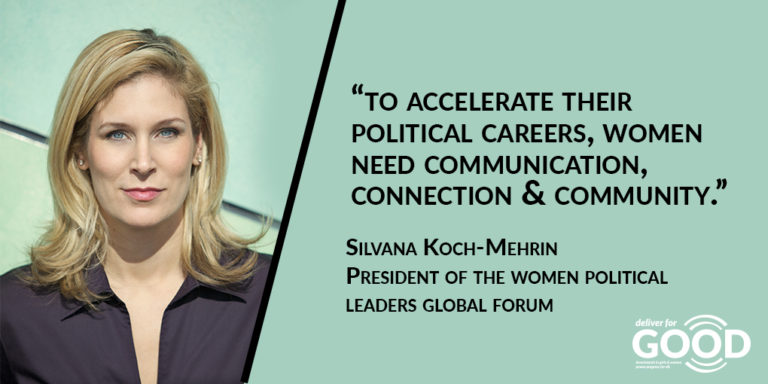
99 years ago World War I ended and the League of Nations was founded. The first Oreo cookie was designed and the pop-up toaster patented. It’s stuff for the history books.
The latest World Economic Forum (WEF) Global Gender Gap Report shows that it will take another 99 years for the world to achieve gender-equal political representation if we continue at our current pace.
Having only one woman for every four men in parliaments around the world is a clear indication of how ineffective societies are at tapping into the potential talent of more than 50% of the population. There are, of course, important variations: Nordic countries are the most gender equal, and Rwanda is the world champion for female participation in politics. Arab and Gulf countries, stand at the other end of the spectrum.
UN Women estimates that globally, men represent 77% of parliamentarians, 82% of government ministers, 93% of heads of government and 94% of heads of state. And every time a woman reaches the top of an organization or political party, it makes global headlines. Today, one can name all of the current female country leaders in less than 30 seconds. This trend extends across the private sector and in academia – the greater the seniority, the fewer women.
There are many reasons to care about this imbalance – Achieving gender equality in political participation has both intrinsic and instrumental value. Women in political office prioritize efforts to advance rights, promote equality, and leverage opportunity for women and girls. It’s a matter of human rights and it’s a matter of good governance. The composition of executives and legislatures also affects the quality of laws and influences the extent of their application. Evidence demonstrates that women leaders are more likely to respond to public needs and tend to cooperate across party lines. Historically, this is not the case for men in power.
Unfortunately, a range of barriers – official and unofficial, formal and informal – limit women’s political participation. The Women Political Leaders Global Forum (WPL) conducted a study on ‘The Female Political Career’. Analysing survey responses from 617 politicians – female and male –from 84 countries, the study was designed to understand the non-legal barriers women face in different phases of the political lifecycle.
The findings tell the same old story – one that applies globally. Women politicians tend to start their careers later, have fewer children, spend more time caring for their families, and arrange their lives to have shorter commutes than their male counterparts. Family commitments continue to constitute a major source of concern among women. “Gender equality begins in our homes,” says Nkosazana Dlamini-Zuma, Chair of the African Union (2010-2016) and a member of the WPL advisory board. Another said “three Ms stand in the way of women: money, media and men”.
Women and men also have different levels and types of political support networks. On average, female politicians receive fewer private donations than their male counterparts and rely more heavily on party sponsorship. Media portrayal and voter perceptions of ‘a woman’s place’ cast a longer shadow over women’s decision to run for office and to pursue higher positions. While both men and women express concern about the many pitfalls of political campaigning, females often experience additional worry around stereotypical discrimination, the difficulty of fundraising, negative advertising, the loss of privacy and not being taken as a serious candidate. This can only change when more women are represented in politics and are seen as equal representatives to their male counterparts.
So what can be done to address these problems? In politics, networks are key. To accelerate their political careers, women need communication, connection and community. WPL aims to increase both the number and the influence of women in political leadership positions, optimising the power of communication and connection to build new communities of knowledge for women political leaders everywhere. Progress happens by convening women political leaders who have the drive and the influence to create positive change.
And this is not just about women. In a flagship campaign, WPL asked male presidents and prime ministers to complete the sentence “We need more women as political leaders because ...”. Among the more than 70 respondents, Canada’s Prime Minister, Justin Trudeau explained: “When women engage in the political process, societies thrive and prosper.”
Michelle Bachelet, President of Chile (2014-2018), rightly puts it: “When one woman is a leader, it changes her. When more women are leaders, it changes politics and policies.”
So much has been accomplished in the last 99 years and so much more can be accomplished in the years ahead. But if we are to achieve our ambitious goals and see truly transformative change, we must make a more concerted effort to strengthen women’s political participation at all levels. Because a woman’s place is in politics.


